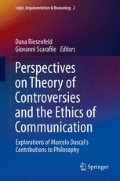Abstract
In this paper we discuss the hypothesis of Dascal (Artificial intelligence as epistemology? In: Villa Nueva E (ed) Information, semantics and epistemology. Blackwell, Oxford, pp 224–241, 1990) according to which the main characteristic of intelligence is the ability to adapt pragmatically to changes in the context in which one is immersed. Our investigation is an inquiry into the role played by habits, in order to establish criteria according to which agents act in the world in reasonable and relevant ways. To begin with, we investigate the logical form of habits, focusing on the distinction between “rational habits” and “crystallized habits” (“degenerated habits”), and their function in the structuring of actions. We argue that habits manifest themselves in terms of a hypothetical prescription: If A (a circumstance), then B (a behavior). Our hypothesis is that habits can be transformed into abilities by means of processes of secondary self-organization that involve the dynamics of rupture, acquisition, and improvement of previous habits. More specifically, we suggest that abilities, characterized as habits that have been refined or perfected, involve a process of secondary self-organization which can be triggered by (a) the perception of (an agent’s own) habitual behavior and the recognition (by the agent) of the necessity of altering part of this behavior and (b) experience of a doubt that may initiate rational abduction. Furthermore, we adapt the notion of abductive reasoning, as defined by Peirce (In: Hartshorne C, Weiss P, Burks AW (eds) Collected papers of Charles Sanders Peirce, vols 1–8. Harvard University Press, Cambridge, MA, 1958), to deal with the creation of hypotheses of conduct and, in particular, the transition from the experience of a doubt to the acquisition of a habit (understood as a readiness to perform an action).
Access this chapter
Tax calculation will be finalised at checkout
Purchases are for personal use only
References
Bresciani, F.E., and I.M.L. D’Ottaviano. 2000. Conceitos básicos de sistêmica. In Auto-organização: estudos interdisciplinares, Coleção CLE, vol. 30, ed. I.M.L. D’Ottaviano and M.E.Q. Gonzalez, 283–306. Campinas: Unicamp.
Dascal, M. 1990. Artificial intelligence as epistemology? In Information, semantics and epistemology, ed. E. Villa Nueva, 224–241. Oxford: Blackwell.
Debrun, M. 2009. Identidade nacional brasileira e auto-organização. Coleção CLE, vol. 53, ed. I.M.L. D’Ottaviano and M.E.Q. Gonzalez. Campinas: Unicamp, Centro de Lógica, Epistemologia e História da Ciência.
Gonzalez, M.E.Q. 2005. Information and mechanical models of intelligence: What can we learn from cognitive science? Pragmatics and Cognition 13(3): 565–582.
Haken, H. 2000. Information and self-organization. Berlin: Springer.
Peirce, C.S. 1958. Collected papers of Charles Sanders Peirce, vols. 1–8, ed. C. Hartshorne, P. Weiss, and A.W. Burks. Cambridge, MA: Harvard University Press.
Acknowledgments
We would like to thank Len Olsen, William Pickering, and our research fellows from the Self-Organization Group and GAEC for their suggestions and support during the preparation of this paper. We would also like to thank FAPESP and CNPq for funding this research. Last, but not least, we dedicate this paper to Marcelo Dascal, in honor of his 70th young and lively years.
Author information
Authors and Affiliations
Corresponding author
Editor information
Editors and Affiliations
Rights and permissions
Copyright information
© 2014 Springer Science+Business Media Dordrecht
About this chapter
Cite this chapter
de Andrade, R.S.C., Broens, M.C., D’Ottaviano, I.M.L., Gonzalez, M.E.Q. (2014). Habit, Self-Organization, and Abduction. In: Riesenfeld, D., Scarafile, G. (eds) Perspectives on Theory of Controversies and the Ethics of Communication. Logic, Argumentation & Reasoning, vol 2. Springer, Dordrecht. https://doi.org/10.1007/978-94-007-7131-4_17
Download citation
DOI: https://doi.org/10.1007/978-94-007-7131-4_17
Published:
Publisher Name: Springer, Dordrecht
Print ISBN: 978-94-007-7130-7
Online ISBN: 978-94-007-7131-4
eBook Packages: Humanities, Social Sciences and LawPhilosophy and Religion (R0)

